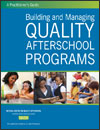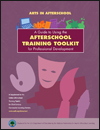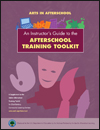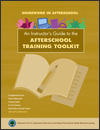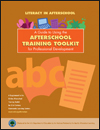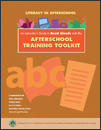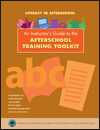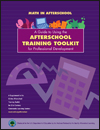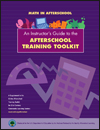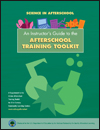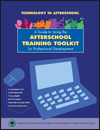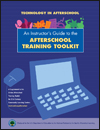SEDL Store - List by Subject - Afterschool
Afterschool
Our Most Popular Product in this Subject Area
|
A Practitioner's Guide: Building and Managing Quality Afterschool Programs (2009) A Practitioner's Guide: Building and Managing Quality Afterschool Programs is designed to share with you the practices that can help you cover it all—great programming, terrific staff, positive relationships, and plenty of resources to lead and sustain successful afterschool programs. |
The six promising practices in afterschool for the arts identified in the Afterschool Training Toolkit are as follows: Building Skills in the Arts; Expressing Yourself Through the Arts; Making Connections to History and Culture; Thinking and Talking About Works of Art; Integrating the Arts With Other Subjects; Involving Families and Communities. Each practice is built on youth development principles and research on effective arts instruction. At their core, the Afterschool Training Toolkit materials are designed to illustrate techniques and activities that leverage student curiosity to make the arts in afterschool both enjoyable and academically relevant. This guide provides professional development ideas for each practice.
The six promising practices in afterschool for the arts identified in the Afterschool Training Toolkit are as follows: Building Skills in the Arts; Expressing Yourself Through the Arts; Making Connections to History and Culture; Thinking and Talking About Works of Art; Integrating the Arts With Other Subjects; Involving Families and Communities. When used with the Afterschool Training Toolkit, the lessons in this instructor’s guide will help you master these promising practices. Once you become proficient at these practices, you should be able to use them to develop other arts lessons.
The four promising practices in afterschool for homework help identified in the Afterschool Training Toolkit are as follows: Involving Day Schools, Families, and Communities; Managing and Organizing the Homework Environment; Monitoring and Communicating About Student Progress; and Tutoring, Mentoring, and Building Study Skills. When used with the Afterschool Training Toolkit, the information in this instructor’s guide will help you master these promising practices. Once you become proficient at these practices, you should be able to use them to develop an effective afterschool homework help program.
The Afterschool Training Toolkit materials are designed to illustrate techniques and activities that leverage student curiosity to make literacy in afterschool both enjoyable and relevant. This guide provides professional development ideas for promising literacy practices in afterschool.
The National Partnership for Quality Afterschool Learning developed this instructor’s guide to accompany its Afterschool Training Toolkit, a free online staff development tool. Both the guide and the toolkit materials are designed to give afterschool instructors the resources they need to build fun, innovative, and academically enriching activities that not only engage students, but extend their knowledge in new ways and increase academic achievement.
The six promising practices in student achievement in literacy identified in the Afterschool Training Toolkit are as follows: Book Discussion Groups and Literature Circles; Read Aloud; Story and Literature Dramatizations; Writing; Family Literacy Events; One-on-One and Small-Group Tutoring. When used with the Afterschool Training Toolkit, the lessons in this instructor’s guide will help you master these promising practices. Once you become proficient at these practices, you should be able to use them to develop other literacy lessons.
The Afterschool Training Toolkit materials are designed to illustrate techniques and activities that leverage student curiosity to make mathematics in afterschool both enjoyable and relevant. This guide provides professional development ideas for each of the seven promising practices in afterschool math enrichment.
The seven promising practices in afterschool math identified in the Afterschool Training Toolkit are as follows: Finding Math; Math Centers; Math Games; Math Projects; Math Tools; Math Tutoring; Family Connections. When used with the Afterschool Training Toolkit, the lessons in this instructor’s guide will help you master these promising practices. Once you become proficient at these practices, you should be able to use them to develop other math lessons.
The five promising practices in afterschool for science identified in the Afterschool Training Toolkit are as follows: Investigating Science Through Inquiry; Exploring Science Through Projects and Problems; Integrating Science Across the Curriculum; Engaging Families and Communities in Science; Tutoring to Enhance Science Skills. When used with the Afterschool Training Toolkit, the lessons in this instructor’s guide will help you master these promising practices. Once you become proficient at these practices, you should be able to use them to develop other science lessons.
This guide focuses on using a practical staff development model for learning about the six technology practices featured in the Afterschool Training Toolkit and how they can support learning. Each technology practice is introduced with two to four activities ranging in length from 15 to 20 minutes. Activities include watching videos, planning lessons, and reading related resources.
The six promising practices in afterschool technology identified in the Afterschool Training Toolkit are as follows: Developing Self-Expression and Creativity; Gathering and Sharing Information; Finding and Solving Problems; Living and Working With Technology; Learning in Virtual Spaces; Building Skills and Understanding. When used with the Afterschool Training Toolkit, the lessons in this instructor’s guide will help you master these promising practices. Once you become proficient at these practices, you should be able to use them to develop other technology lessons.

